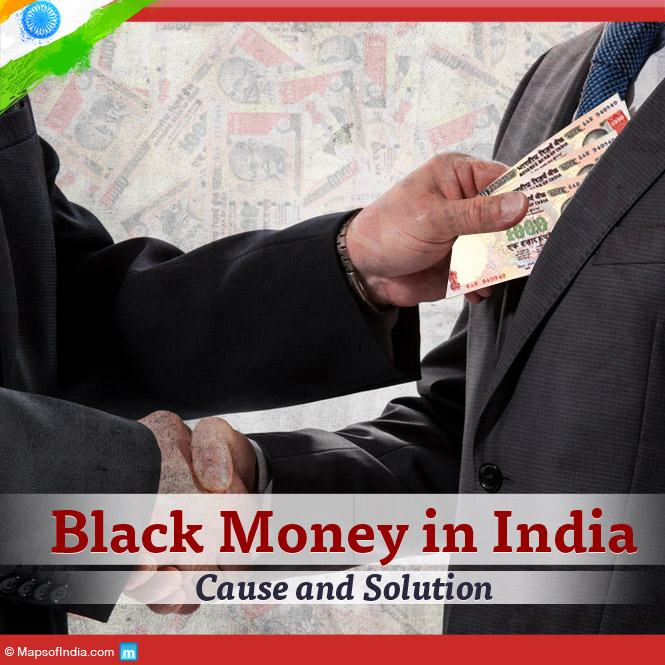What is Black Money
There is a perception that black money is bad money; bad for the nation and bad for the economy. Not really. In the first place, we need to understand the meaning of black money. Black money is explained as money earned on which no income tax is paid to the government. In other words, this is money that has been generated by providing goods or services and being paid in return. The problem is that the goods or services provided for black money are usually not legitimate and therefore cannot be disclosed.
Let’s take a look at the age-old practice of giving and taking of bribes. In India, the practice of giving bribes is seen as a necessary evil, with people themselves participating in the same in order to get their work done. So the citizens are by and large, the root cause from where the illegal money gets generated. This is followed by businesses of all sizes, whether it’s a small-time sole proprietor, a small or medium enterprise owner or an established company, they all find it easier to offer money to get their job done faster.
So who are the gainers of this easy money? The recipients are politicians, bureaucrats at all levels, police, and almost all government departments. The private sector is not excluded either. Corruption is all pervasive in the Indian system of governance and business.
Once a bribe is received, a recipient cannot disclose this income as it is illegitimate but it is still an income. This money will now circulate in the economy through various channels and generate further income downstream. The problem is that the government is left out of this money cycle as it does not earn any income but the economy benefits as the money continues to circulate, generating wealth as it passes hands.
Sectors which absorb and recycle black money
Money generated illegally has to be parked somewhere and a large part of the money is invested in sectors that include:
- Building and construction industry
- Gems and Jewelry industry
- Film and Entertainment industry
To fight the elections, all political parties require large sums of unaccounted money to fund their election campaign. According to the Centre for Media Studies, Delhi, around $4.9 billion (Rs 30,000 crore approx) was spent during this year’s election campaign for Lok Sabha and State Assembly elections. This means that these elections were the second-most expensive elections after the 2012 US election campaign that cost $6 billion.
Political parties need large amounts of cash to pay party workers in cash, liquor, and even drugs (as seen recently in Punjab). Then there is the muscle power required to influence and enforce election outcomes.
The question is, who provided the money and what do they get in return?
In the year 2011, a research study conducted by Devesh Kapur and Milan Vaishnav and published for the Centre for Global Development, concluded that there was a cyclical correlation between elections and the price of cement. In the run up to elections, the builder segment feeds cash to the political parties thereby leaving no money for investments in their projects. This in turn results in weakening of demand for cement in the run-up to the elections.
However, post elections, the politicians return the favour to the builder segment by clearing various projects. This results in a frenzy of building activity thereby resulting in an increase in demand for cement. This is just one example that shows the money flow cycle during and post elections.
There are other sectors as well, but these are some of the largest segments where unaccounted money circulates. These sectors then feed the political parties and individual politicians with large sums of cash on an ‘as and when’ needed basis. In return, they get favours from the politicians and government largesse for substantial profit gains, and the cycle of black money continues.
There are two major issues here:
- Illegal act of receiving a bribe
- Non-disclosure of Income to the Income Tax authorities
There is a perception that people do not pay taxes because the taxation levels are high. This may not be entirely true. There are three major categories of people who earn black money:
- Bribe receivers
- Service providers who provide illegitimate services and therefore cannot disclose their source of income
- Service providers like lawyers, doctors, consultants who provide legitimate services but do not disclose the source of income
The Income Tax Act forces an assessee to disclose not only his income but also his ‘source’ of income. For the last two categories above, the declaration of the source of income is the primary reason for not paying Income Tax. It is not the tax rate that holds them back but declaring the source of income. The loser is the government.
Solution of Black Money
The government has to segregate the two issues. One is of monitoring, catching and prosecuting of a bribe receiver and the other is collection of Income Tax. The Income Tax department today is involved with both these activities and therefore the government must separate the investigation from collection. The investigation and prosecution must be left to other agencies like the Police and other law enforcement agencies, while the Income Tax Department must focus only on collection.
If the government can amend the law wherein an assessee does not disclose his source of income but pays the tax on Income earned, the tax collection by the government will rise significantly and in turn the additional funds collected by the government could then be re-invested in infrastructure and to finance social welfare programs, etc. This measure will ensure that (2) and (3) above come under the tax net and peopl pay the due taxes. The segment under (1) above has to be addressed by the law enforcement authorities.
Given India’s fiscal deficit situation, it is imperative for the new government to initiate Tax reforms to encourage people to not only come under the tax net and also to pay taxes on income earned. In addition, the government must take immediate steps for bringing back the black money stashed abroad through inter-governmental negotiations backed by economic and diplomatic pressure. India must exert pressure on countries that offer tax havens. The United States has shown the way and it’s up to the new government to walk the talk.
Related Information:
After Note Ban Be Ready for ‘Benami’ Axe
Note Ban Juggernaut May Hit Poll Campaigns in UP, Punjab
Spiritual Life Lessons after Note Ban in India
Rs 500 and Rs 1000 Notes Banned, New Rs 2,000 Note to be out on 10th November
Union Budget Expectations 2014-15






